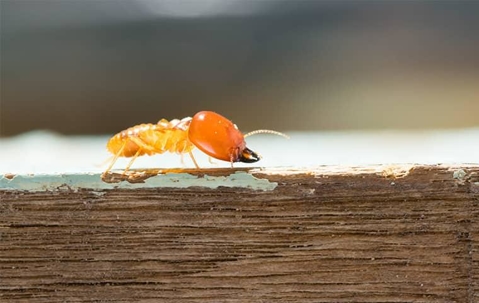Do-it-yourself pest control isn’t all it’s cracked up to be. Sure, you can catch some fruit flies in that homemade vinegar trap and maybe you’ll manage to repel some pests for a while with those essential oils, but DIY methods like these often only treat the surface of the problem. If you’ve got termites on your Denver property, home remedies won’t be enough to stop an infestation. Here’s what not to do about termites in your home.
About Termites
Termites are extremely destructive pests. It’s estimated that termites damage some 600,000 American homes a year, costing homeowners over $5 billion annually. These pests can completely destroy a home if given enough time, causing floors and walls to collapse.
These tiny insects are highly organized and dedicated to their work. Like ants and bees, termites are social insects with specific roles within their colony. Worker termites can eat 24/7, causing significant damage to wooden structures.
Termites can be separated into three main categories: drywood termites, dampwood termites, and subterranean termites. Depending on the species, termites will make their colony in their preferred habitat and the DIY treatment you use for one type might be totally ineffective against another.
Why DIY Termite Control Doesn’t Work
Maybe you want to save money, maybe you just like to do things for yourself, but whatever the reason, you’ve chosen to deal with your termite problem on your own. Unfortunately, this is a bad move. Most home termite control methods are ineffective, or at best, temporary solutions that don’t eliminate your termite problem at the source.
- Orange oil – When applied as a spot treatment, this method is meant to destroy the exoskeletons of termites as well as their eggs. But orange oil is only effective against drywood termites, not the common subterranean termite, and the treatment often leaves many surviving termites behind.
- Diatomaceous earth – This powdery substance is meant to suck moisture from termites, causing them to dry up and die. It must be thoroughly applied to be effective, and often termites will be missed, and the colony will continue to thrive.
- Store-bought baiting stations – The intention is that termites will take the deadly bait back to their colony, eliminating your termite problem at the source. The problem is, termites actually have to find the bait first, and without proper expertise, you could be placing your baiting stations in the wrong areas.
Effective Termite Prevention Tips
While DIY termite control rarely works, there are some effective termite prevention tips that you can follow.
- Address moisture – Make sure there is no excess water accumulating around your property. Clear drains and gutters and repair leaky fixtures. Consider installing a dehumidifier.
- Limit wood-to-soil contact – Check for wood segments of your property making contact with soil. Establish a gravel barrier around the perimeter of your property.
- Clean your yard – Eliminate or move woodpiles, fallen trees, rotting logs, or other areas that might attract termites to your property.
While you don’t need a professional chef to cook your dinner or a mechanic to change your oil, when it comes to termite control, you need help from the experts if you want it done right.
At White Knight Pest Control, we get rid of your termites and keep them from coming back. Starting with a rigorous inspection, we identify the termite activity in your home and implement a targeted treatment using industry-leading Termidor®. We will also install Termi-Shield Termite Monitoring technology at no cost, and we offer wood-destroying insect reports for homebuyers. Contact us today for your free estimate.

